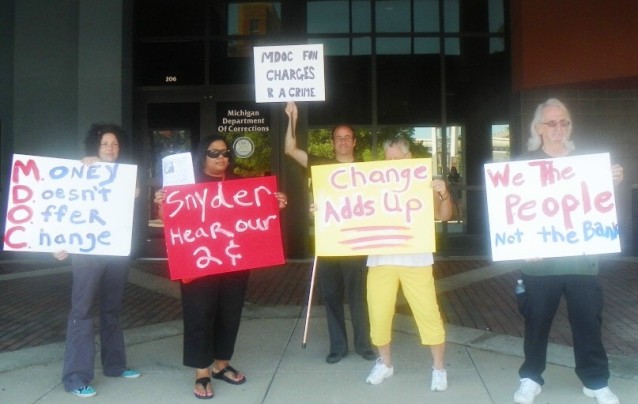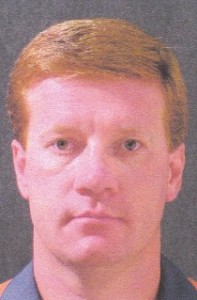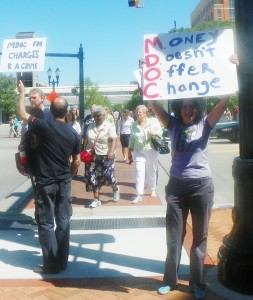
- (L to R) Cathryn Bachus, Robin Brooks, Robert Wagner, (unknown), and Robert Hart protest rate hikes for calls to their loved ones in prison at MDOC HQ, Lansing, July 7, 2011
By Diane Bukowski
July 16, 2011
LANSING – Family members and friends of Michigan prisoners came from as far away as Holland to march outside the Michigan Department of Corrections (MDOC) headquarters here July 12. They said recent prison phone rate hikes of 80 percent have prevented their loved ones from calling them as often as needed to stay sane and rehabilitate themselves.
 The rate hike resulted from a contract with Public Communications Services, Inc.. It is a subsidiary of Global Tel-Link.
The rate hike resulted from a contract with Public Communications Services, Inc.. It is a subsidiary of Global Tel-Link.
 Global Tel Link is also connected with DSI-ITI.
Global Tel Link is also connected with DSI-ITI.
On July 13, the day after the protest, Governor Rick Snyder signed an MDOC appropriations bill with the clause, “Any contract for prisoner telephone services shall impose fee schedules for prisoner telephone calls that are no greater than the fee schedules for standard calls placed by residential users in the area surrounding the correctional facility.”
It is yet unclear what this will mean, but prisoner advocates say they hope it is a victory. The protest was well-covered in the state’s capitol by print and television media.

Mitchell Pugh, incarcerated since 1988 at the age of 16, is one of 800 parolable lifers kept behind bars far beyond what their sentencing judges intended, despite evidence of rehabilitation
“We used to talk half an hour a day,” said Cathryn Bachus of her boyfriend Mitchell Pugh, who has been incarcerated since 1988, when he was 16, and is serving a parolable life sentence. “Now we can only afford twice a week. I travel to see him, but it’s a long way from Holland to Carson City.”
Bachus organized the protest.
A federal class-action lawsuit, Foster-Bey v. Rubitschun, filed on behalf of over 800 parolable lifers, who have been imprisoned under Gov. John Engler’s parole board mandates long beyond what their sentencing judges intended, resulted at least indirectly in the release of some, she said.
U.S. District Court Judge Marianne Battani ruled in their favor in 2007, but in 2010, the U.S. Sixth Circuit Court of Appeals ordered her to grant the state’s motion for summary disposition. At least three lead plaintiffs, Kenneth Foster-Bey, John Alexander, and Waymon Kincaid, are still imprisoned after 30 years and more, while one, William Sleeper, was paroled in 2009.
Bachus said a request for commutation of Pugh’s sentence, endorsed by the Carson City Correctional Facility warden based on Pugh’s progress in rehabilitation, including his assistance to other prisoners, was denied after Snyder took office.
“I just think that being able to communicate with your loved one aids in their rehabilitation,” said Robin Brooks of West Bloomfield, whose son is incarcerated. “For the state to hinder that shows they are not truly into ‘correcting.’ The money they are spending on additional equipment supposedly to keep prisoners from getting cell phones can be used for more rehabilitation and education, as well as pensions for state workers like the guards.”
She said aside from problems with rates, the PCS system requires that each person the prisoner calls must set up their own account. She said that is very difficult for elderly people like her son’s grandparents, for whom she had to set up account herself.
Robert Hart was there on behalf of his son, James Howard Hart, who is serving 13 ½ to 20 years in prison. They are Native American.
His son was featured in a recent Detroit Free Press article decrying changes to prison medication policy which Hart said have created severe problems for him, since he is on anti-depressants.
“If he has a problem, I can no longer afford to take his calls four times a week, as I did before,” Hart said. “In addition, the PCS contract was supposed to provide more pay phones for prisoners to use, but there hasn’t been any evidence of that yet.”
Robert Wagner of Warren said his calls to his friend have helped keep him from going crazy while inside the walls.
“I’ve had to cut my calls in half, and the expense has resulted in me not being able to visit as much or provide food to make up for the outrageously bad food service in the prisons,” Wagner said. “It’s incredibly important for the prisoners to have contact with their loved ones. It helps them stay out of trouble because they need to avoid contact as much as possible with other prisoners to keep out of fights. Research shows that contact from the outside also helps them to better re-acclimate to society, and society benefits because they are safer individuals when they come out.”
Barbara Levine of the Citizens Alliance on Prisons and Public Spending said in a release, “This resulted from a large group effort . . . . the pressure from families and advocates created a groundswell and a moral rationale that helped put the issue over the top.” But her statement included several warnings, including whether PCS, which has a signed contract, will accept the change. Click on Barbara Levine analysis for full statement.
A VOD phone call to Global Tel-Link, the parent company of PCS, had not been returned by press time. The VOD has submitted an FOIA to the MDOC for a copy of the contract with PCS.
Below are links to some complaints submitted by users of Global Tel-Link to the online Complaint Board:
STATEMENT OF APPRECIATION FROM CATHRYN JOHNSON-BACHUS
“I would like to extend a big thank you to all of the individuals who got involved on this phone issue by writing letters, making phone calls, showing up to the protest and researching the details that ultimately are in the process of being changed.
There were many who wanted to attend the protest on Tuesday but were unable to due to travel distance, the high cost of fuel and work restraints. Though they weren’t there in person, they did what they could in other ways that brought attention to this matter and as a result we received an equal amount of interest from the media which helps tremendously on educating the public as well.
A big thank you to Michael Steinburg of the ACLU for his help and sending Beile his wonderful legal intern to the protest to support us, Diane Bukowski for her coverage in the Voice of Detroit and for standing with us in the humidity for half the day, Barbara Levine and the entire CAPPS organization, members of Mi-Cure, the media who allowed our voices to be heard and last but definitely not least the prisoners who supported this endeavor and sent me the thank you card for fighting for their need to communicate with their families.
It is my hope that what we have worked hard at over the last 30 days, continues to make a difference in the lives of those who struggle through the mental and emotional stress of incarceration and the additional financial burden that the high cost of communication can add to the top of it. It is very promising that the [governor signed the bill]. We can only hope that the resolution is a long term resolution and there are no more ambiguous terms, exceptions, justifications or last minute changes.
In closing, I would like to say that it took the collaboration of many people from many walks of life to make this happen, from the head of organizations and legal teams, to the families enduring a loved one in the system- right down to the prisoners themselves, to bring light and justice to all the lives that are involved with the DOC. I certainly hope that this action sets the stage for future changes, not only in how the Department moves forward in making promising changes but in how actively we all get involved on important issues as well.”
Cathryn Johnson-Bachus can be emailed at, ccpinmich@gmail.com, by calling 989-615-6097, or by mailing her at P.O. Box 2154, Holland, Michigan, 49422. The Michigan Citizens Alliance on Prisons and Public Spending (Mi-CAPPS) can be accessed at http://www.capps-mi.org/, phone 517-482-7753, fax 517-482-7754, and email capps@capps-mi.org.
Citizens for Prison Reform is meeting Sat. July 23 9:30 a.m.-12noon, at Mt. Hope Church, 202 South Creyts Road, Lansing, MI 48917-9284, (517) 321-2780.










Wonderful article! We will be linking to this particularly great content on our website.
Keep up the good writing.